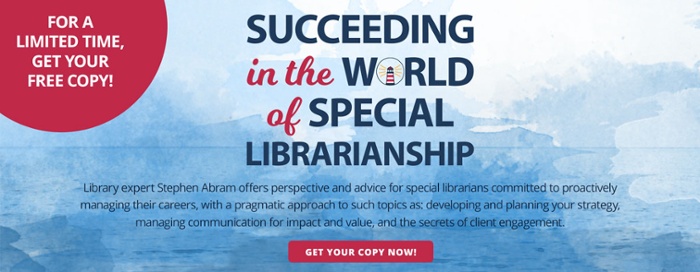
This blog post on client engagement in special libraries is inspired by a reader comment. Thanks!
“I appreciate Stephen Abram's tips. Could you talk more of 'engagement'? How can special librarians 'engage' employees? THANK YOU!”
This reader comment has inspired me to think more deeply about how special librarians and information professionals need to behave differently on the customer engagement front. Yes, special librarians are different!
Let’s set our terms first. What is customer engagement? The classic definition is:
“Customer engagement is a business communication connection between an external stakeholder (consumer) and an organization (company or brand) through various channels of correspondence. This connection can be a reaction, interaction, effect or overall customer experience, which takes place online and offline.”
[source]
Most of us will experience a small twinge at reading this definition. We don’t really think of our users as ‘consumers’ or as ‘external’. So, I’ll propose this one:
Customer engagement is the process of actively building, nurturing, and managing relationships with customers.
I like that one better. Your goals are a great professional relationship over the long term, and a wonderful experience that meets their needs at the moment of truth—the first few ‘engagements’.
What are the goals of client engagement in special libraries?
Engagement marketing, sometimes called "experiential marketing", "event marketing", "on-ground marketing", "live marketing", "participation marketing", or "special events" is a marketing strategy that directly engages consumers and invites and encourages them to participate in the evolution of a brand or a brand...
[source]
Every interaction, every moment of truth is a marketing act in addition to the core task of answering a need—your customer’s need. That said, you share the same, standard long-term goals of marketing:
- Building your brand as a special library
- Building your personal brand as a special librarian and colleague
- Setting the foundation for repeat business
- Building and improving your relationships with your ‘market’—your colleagues
What do we call those with whom we engage?
This is often where librarian jargon fails us. Our colleagues in library land use these words to describe the persons with whom they engage (as with all library jargon this can never be a complete list!):
- users
- cardholders
- patrons
- members
- customers
- clients
- learners
- parents
- kids and teens
- scholars
- faculty members
All of these are, of necessity, group terms for market niches in library sectors that serve larger populations. In special libraries, our services are offered to the:
- client
- colleague
- Mary, Cindy, Mohammed, or Joe
See the big difference here? The words are not plural. We, as special librarians, are usually more focused on a known individual rather than required to offer services based on larger demographics. We know their names—and our early days at our employer are largely focused on getting to know people and their needs. As we build internal networks of solid relationships our value increases, and by design, our work product and services get better.
My preferred noun in our space is colleague. I prefer that to client (although that’s OK too) because it sets up a relationship dynamic (words and labels drive mindsets and behaviours) between you and those you service that is on a peer level and doesn’t risk ‘servant’ modes. Our value isn’t in step-and-fetch-it librarianship. We add value as peers.
My first tips for building client engagement in special libraries:
- Park the traditional library user language at the door
- Develop a mindset of colleague and peer—you are your clients’ equal
- Set up your relationship and engagement strategy on an equal footing
This will pay off highly over the longer term.
-Stephen
Stephen Abram is a popular Lucidea Webinars presenter and consultant. He is the past president of SLA, and the Canadian and Ontario Library Associations. He is the CEO of Lighthouse Consulting and the executive director of the Federation of Ontario Public Libraries. He also blogs personally at Stephen’s Lighthouse. Check out his new book from Lucidea Press, Succeeding in the world of Special Librarianship!
To find out more about Lucidea and solutions for capturing, organizing and sharing knowledge resources in special libraries to help build client engagement, read our SLA Hot Topics Whitepaper, What Does Success Look Like?



